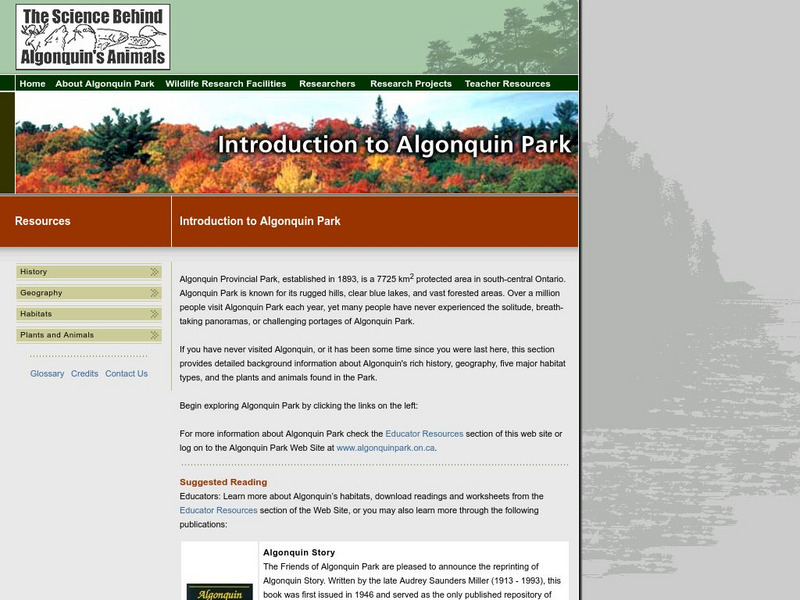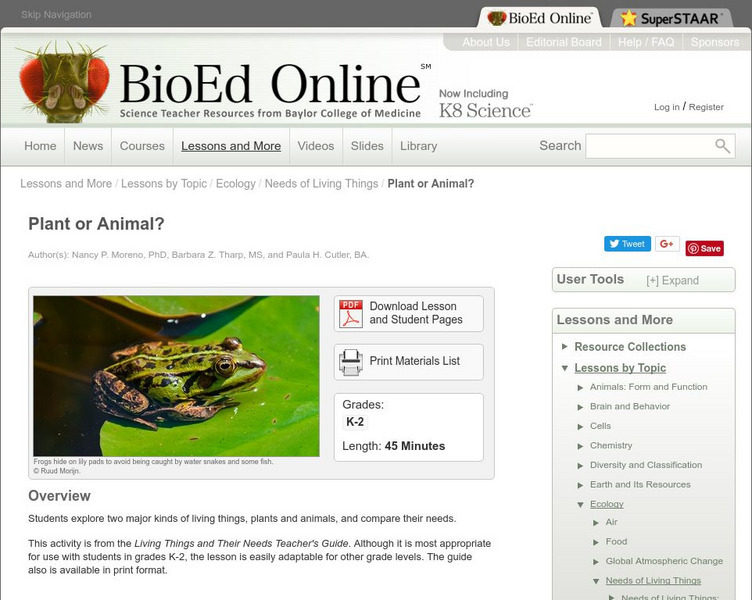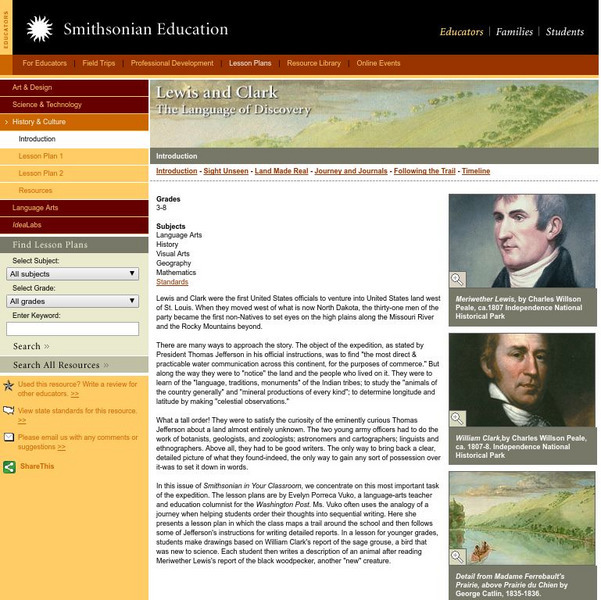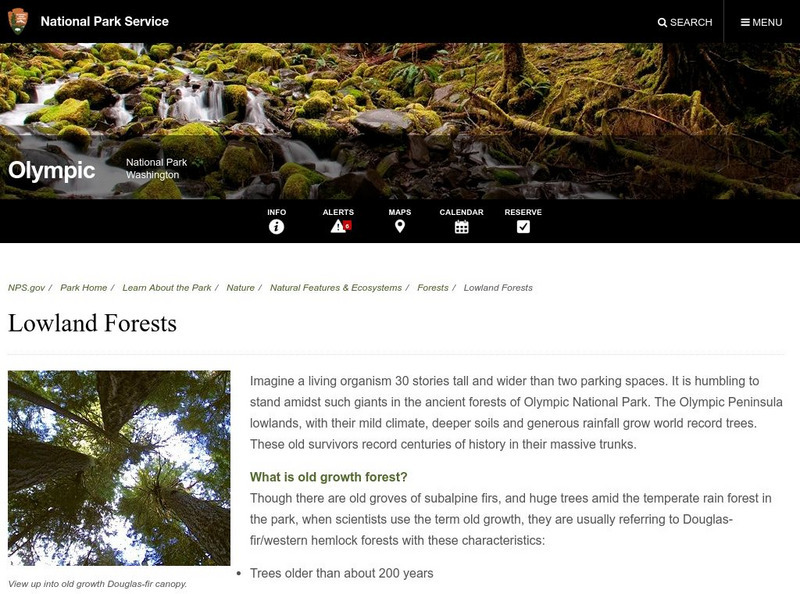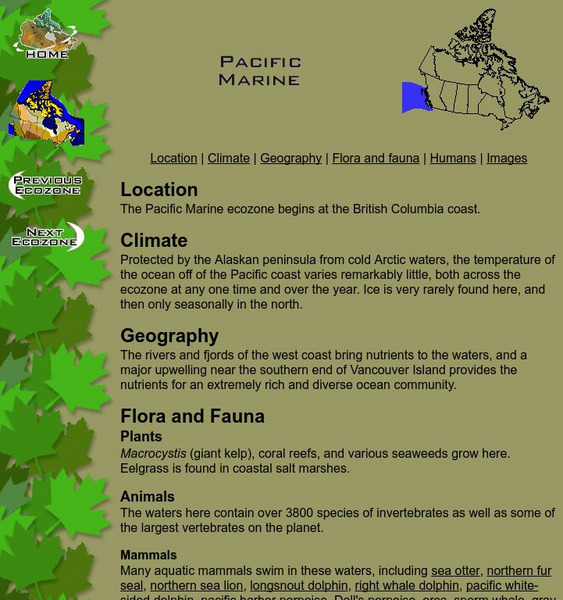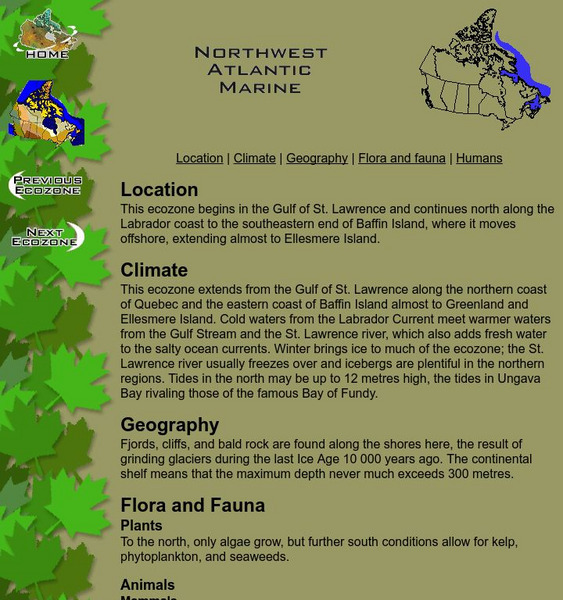Science Struck
Science Struck: Grassland Biome: Animals and Plants
Describes the characteristics, biodiversity, and the adaptations of the plants and animals of temperate and tropical grasslands.
Science Struck
Science Struck: Desert Biome: A Guide to Its Animals and Plants
Describes many of the plants and animals that live in deserts and their special adaptations that have enabled them to survive there. Also describes four types of deserts.
Science Struck
Science Struck: Taiga Biome: Taiga Animals and Plants
Describes the characteristics of the taiga biome and the plants and animals that live there.
Encyclopedia of Earth
Encyclopedia of Earth: Adaptations of Desert Plants
The ways in which plants have adapted through evolution in order to survive in a desert environment are described in this article. Getting water and retaining water are key to their survival, including protecting themselves from animals...
Science Struck
Science Struck: Flora and Fauna of the Ordovician Period
Describes plants and animals that lived during the Ordovician Period, where it falls in the geologic time scale, tectonic activity happening then, the climate and environment, and extinction events.
A-Z Animals
A Z Animals: Reference: Habitats: Swamps and Wetlands
Learn about the plants, animals, and other characteristics of some wetland ecosystems.
Other
Buzzle.com: Animal Sake: Triassic Period Animals
Brief descriptions of the climate of the Triassic Period and of the plants and animals. Includes a lengthy list of the animals that lived during that time.
Other
Florida Department of Environmental Protection: Life in a Spring
Learn all about the diverse species that live in the Florida Springs. Separate sections for fish, reptiles and amphibians, birds and mammals, insects and invertebrates, and plants.
HotChalk
Hot Chalk: Lesson Plans Page: Plants and Animals
In this lesson plan, young students will be able to identify a plant's parts, explain their functions, diagram a plant, and create a mobile to demonstrate their understanding.
University of Illinois
University of Illinois: Illinois Natural History Survey: The Tallgrass Prairie
This site from the Illinois Natural History Survey provides a large list of grassland plants of the Illinois Tallgrass Prairie - some 851 species. You can find out the common name, scientific name, habitat, flowering period, fruits, and...
Science Struck
Science Struck: Mesozoic Era Timeline and Important Facts
Provides an overview of the Mesozoic Era, its time frame, geological and tectonic activities, the climate, plants and animals, and extinction events towards the end of this era.
Other
Travellers Worldwide: Animal Care in Australia
A profile of each of the various animals found at the Wildlife Rehabilitation Project in Australia. Photos and basic facts of each animal are included.
Bio Topics
Bio Topics: Competition
Find out about what types of resources different species will compete to obtain. Answer competition questions by mousing over different pictures of animal and plants.
Friends of Algonquin Park
The Science Behind Algonquin's Animals: Deciduous Forest
Learn about this hardwood forest, its wildlife, and plant species. View a panorama movie of a typical Hardwood Forest in the summer.
Friends of Algonquin Park
The Science Behind Algonquin's Animals: Coniferous Forest
Learn about the Coniferous Forest and its wildlife and plant species. View a panorama of a Coniferous Forest in Algonquin Provincial Park.
BioEd Online
Bio Ed Online: Living Things and Their Needs: Plant or Animal?
In this lesson, students investigate and compare the needs of plants and animals. The lesson can be downloaded in PDF format.
Mariners' Museum and Park
Age of Exploration: The Great Exchange
A great description and explanation of the exchange that took place between the Old World and New World as a result of European exploration. Find examples of plants, animals, and diseases that were traded as a result of exploration and...
Curated OER
Bureau of Land Management: Alaska's Cold Desert
Learn about the Arctic tundra biome of Alaska. A discussion of its characteristics, and the animals and the plants that live there.
Smithsonian Institution
Smithsonian Education: Lewis and Clark: The Language of Discovery
Lewis and Clark discovered many new animals and plants, and they mapped areas unknown. Young students will draw pictures of some of the discovered animals and write about them; older students will mimic the mapping expedition around...
Curated OER
National Park Service: Lowland Forests
Lowland coniferous forest info. Biomass, interdependence, plants, and animals found here.
McGill University
Mc Gill University: Canadian Biodiversity: Ecozones: Boreal Plains
The Boreal Plains are located in the center of Alberta and extend into Saskatchewan and Manitoba. This is a brief, concise description of the location, climate, geology and flora and fauna. It includes a collection of images of the...
McGill University
Mc Gill University: Canadian Biodiversity: Ecozones: Pacific Marine
The Pacific Marine ecozone begins at the British Columbia Coast. This is a brief, concise description of the location, climate, geology and flora and fauna. It includes some images of the animals and birds native to the location. Many of...
McGill University
Mc Gill University: Canadian Biodiversity: Ecozones: Northwest Atlantic Marine
The Northwest Atlantic Marine ecozone begins in the Gulf of St. Lawrence and extends to the southeastern end of Baffin Island. This is a brief, concise description of the location, climate, geology, and flora and fauna. It includes some...
Science Struck
Science Struck: Arabian Desert Facts
Presents interesting information about the Arabian Desert, including its physical geography, climate, plants and animals, their adaptations to the environment, natural resources, and threats to its habitats.
Other popular searches
- Plants and Animals
- Arctic Plants and Animals
- Aquatic Plants and Animals
- Coastal Plants and Animals
- Artic Plants and Animals
- Plants and Animals Needs
- Plants and Animals Interact
- Desert Plants and Animals
- Plants and Animals Die
- Attic Plants and Animals
- Comparing Plants and Animals
- Animals Plants and Water







